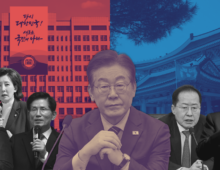Beijing has made use of gray-zone tactics to goad Seoul without inciting conflict, flipping around logic of deterrence
A survey by the Sinophone Borderlands project last year showed that 81% of South Korean respondents expressed negative sentiments about China. This is a sharp increase from just a few years ago: A Pew Research poll from 2015 revealed that 61% of South Koreans had a favorable view of China.
Experts typically explain this sudden change due to tensions in bilateral relations, such as the deployment of the U.S. Terminal High Altitude Area Defense (THAAD) missile defense system. But another reason for South Koreans’ worsening attitude toward China is its use of foreign policy actions that experts often label “gray zone tactics.”
A survey by the Sinophone Borderlands project last year showed that 81% of South Korean respondents expressed negative sentiments about China. This is a sharp increase from just a few years ago: A Pew Research poll from 2015 revealed that 61% of South Koreans had a favorable view of China.
Experts typically explain this sudden change due to tensions in bilateral relations, such as the deployment of the U.S. Terminal High Altitude Area Defense (THAAD) missile defense system. But another reason for South Koreans’ worsening attitude toward China is its use of foreign policy actions that experts often label “gray zone tactics.”
Get your
KoreaPro
subscription today!
Unlock article access by becoming a KOREA PRO member today!
Unlock your access
to all our features.
Standard Annual plan includes:
-
Receive full archive access, full suite of newsletter products
-
Month in Review via email and the KOREA PRO website
-
Exclusive invites and priority access to member events
-
One year of access to NK News and NK News podcast
There are three plans available:
Lite, Standard and
Premium.
Explore which would be
the best one for you.
Explore membership options
© Korea Risk Group. All rights reserved.
No part of this content may be reproduced, distributed, or used for
commercial purposes without prior written permission from Korea Risk
Group.












